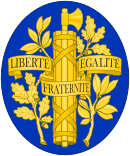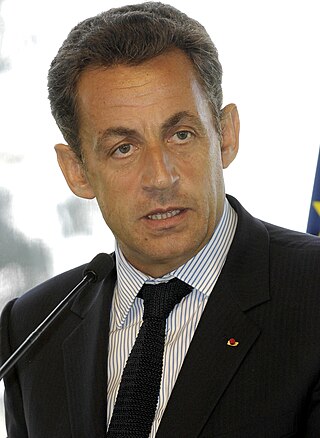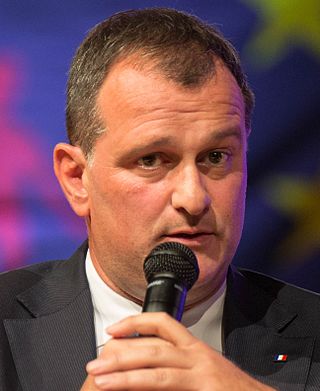 |
|---|
Cantonal elections to elect half the membership of the general councils of France's 100 departments were held on 9 and 16 March 2008. These elections coincided with the municipal elections, in which the left did well.
 |
|---|
Cantonal elections to elect half the membership of the general councils of France's 100 departments were held on 9 and 16 March 2008. These elections coincided with the municipal elections, in which the left did well.
The cantonal elections use a two-round system similar to that employed in the country's legislative elections.

| Party/Alliance | Departments | Votes | % (first round) | Votes | % (second round) | |
|---|---|---|---|---|---|---|
| PS | 3,572,789 | 26.73% | 2,415,348 | 35.11% | ||
| UMP | 3,158,400 | 23.63% | 1,843,500 | 26.80% | ||
| Miscellaneous Right | 2,016,938 | 15.09% | 1,035,770 | 15.06% | ||
| PCF | 2 | 1,172,378 | 8.77% | 387,397 | 5.63% | |
| Miscellaneous Left | 0 | 898,717 | 6.72% | 506,403 | 7.36% | |
| FN | 0 | 647,749 | 4.85% | 11,232 | 0.16% | |
| MoDem | 2 | 590,519 | 4.42% | 202,439 | 2.94% | |
| Les Verts | 0 | 558,612 | 4.18% | 106,789 | 1.55% | |
| NC | 2 | 265,318 | 1.99% | 161,575 | 2.35% | |
| PRG | 2 | 183,208 | 1.37% | 100,861 | 1.47% | |
| Miscellaneous | 0 | 129,925 | 0.97% | 68,486 | 1% | |
| Regionalists | 0 | 58,441 | 0.44% | 14,785 | 0.21% | |
| Far-Left | 0 | 50,047 | 0.37% | 7,825 | 0.11% | |
| Ecologists | 0 | 40,966 | 0.31% | 17,466 | 0.25% | |
| MNR | 0 | 19,918 | 0.15% | 0 | 0.00% | |

The Union for a Popular Movement was a centre-right political party in France that was one of the two major contemporary political parties in France along with the centre-left Socialist Party (PS). The UMP was formed in 2002 as a merger of several centre-right parties under the leadership of President Jacques Chirac. In May 2015, the party was renamed and succeeded by The Republicans.

The administrative divisions of France are concerned with the institutional and territorial organization of French territory. These territories are located in many parts of the world. There are many administrative divisions, which may have political, electoral (districts), or administrative objectives. All the inhabited territories are represented in the National Assembly, Senate and Economic and Social Council and their citizens have French citizenship and elect the President of France.

The Radical Party of the Left is a social-liberal political party in France. A party in the Radical tradition, since 1972 the PRG was a close ally of the major party of the centre-left in France, the Socialist Party. After the 2017 presidential and legislative elections, negotiations to merge the PRG with the Radical Party began and the refounding congress to reunite the parties into the Radical Movement was held on 9 and 10 December 2017. However, a faction of ex-PRG members, including its last president Sylvia Pinel, split from the Radical Movement in February 2019 due to its expected alliance with La République En Marche in the European elections and resurrected the PRG.

The French legislative elections took place on 10 June and 17 June 2007 to elect the 13th National Assembly of the Fifth Republic, a few weeks after the French presidential election run-off on 6 May. 7,639 candidates stood for 577 seats, including France's overseas possessions. Early first-round results projected a large majority for President Nicolas Sarkozy's UMP and its allies; however, second-round results showed a closer race and a stronger left. Nevertheless, the right retained its majority from 2002 despite losing some 40 seats to the Socialists.

Presidential elections were held in France on 21 and 22 April 2007 to elect the successor to Jacques Chirac as president of France for a five-year term. As no candidate received a majority of the vote, a second round was held on 5 and 6 May 2007 between the two leading candidates, Nicolas Sarkozy and Ségolène Royal. Sarkozy was elected with 53% of the vote.
The Centrists, formerly known as New Centre and European Social Liberal Party, is a centre-right political party in France formed by the members of the Union for French Democracy (UDF) – including 18 of the 29 members of the UDF in the National Assembly) – who did not agree with François Bayrou's decision to found the Democratic Movement (MoDem) and wanted to support the newly elected president Nicolas Sarkozy, continuing the UDF-Union for a Popular Movement (UMP) alliance.

Cantonal elections to elect half the membership of the general councils of France's 100 departments were held on 21 and 28 March 2004. These elections coincided with the left's landslide in the regional elections held at the same time and also resulted in strong performances by the Socialist Party (PS) and its allies on the left, leaving the Socialists in control of a majority of departments.

The French municipal elections of 2008 were held on 9 and 16 March to elect the municipal councils of France's 36,782 communes. The first task of each newly constituted municipal council was to elect a mayor.

Cantonal elections to elect half the membership of the general councils of France's 100 departments were held on 11 and 18 March 2001. While the left did poorly in the municipal elections held on the same dates, it emerged as the overall winner in the cantonal elections, gaining control of six departments and losing that of just one.

Louis Aliot is a French politician, a lawyer by profession, and the vice president of the National Rally since 16 January 2011. A member of the FN Executive Office, Executive Committee and Central Committee, Aliot has been a regional councillor since 1998 and a municipal councillor of Perpignan (2008–2009). Louis Aliot has been the mayor of Perpignan since 3 July 2020.

The Left Front was a French electoral alliance and a political movement created for the 2009 European elections by the French Communist Party and the Left Party when a left-wing minority faction decided to leave the Socialist Party, and the Unitary Left, a group which left the New Anticapitalist Party. The alliance was subsequently extended for the 2010 regional elections and the 2012 presidential election and the subsequent parliamentary election.

Regional elections were held in France on 14 and 21 March 2010. At stake were the presidencies of each of France's 26 régions, which, though they do not have legislative autonomy, manage sizable budgets.

Legislative elections took place on 10 and 17 June 2012 to select the members of the 14th National Assembly of the Fifth Republic, a little over a month after the French presidential election run-off held on 6 May.

The Constitutional Council of France approved the redistricting of electoral boundaries in February 2010 to reflect France's changing demographics. The population ratio between the most populated and least populated constituencies was reduced from the 1986 redistricting results of 1:3.6 to 1:2. In effect, the number of seats increased in areas held by the centre-right coalition led by Union for a Popular Movement at the expense of the Socialist-led centre-left coalition. The 2010 redistricting process not only brought down the rule of two deputies per department to one, it also created eleven constituencies for French residents overseas.
The Departmental Council of Corrèze, formerly the General Council of Corrèze, is the departmental council of Corrèze, Nouvelle-Aquitaine, France. It was presided over by François Hollande from 2008 to 2012, who departed from this position when he took office as the President of France on 15 May 2012. It includes 38 members, known as departmental councillors or general councillors until 2015.

The Republicans is a liberal-conservative political party in France, largely inspired by the Gaullist tradition. It holds pro-European views. The party was formed on 30 May 2015 from the renaming and refoundation of the Union for a Popular Movement (UMP), which had been established in 2002 under the leadership of then President of France Jacques Chirac.

The Republicans held a presidential primary election, officially called the open primary of the right and centre, to select a candidate for the 2017 presidential election. It took place on 20 November 2016, with a runoff on 27 November since no candidate obtained at least 50% of the vote in the first round. It was the first time an open primary had been held for The Republicans or its predecessor parties.
A by-election was held in Haute-Garonne's 8th constituency on 11 March 2018, with a second round on 18 March as no candidate secured a majority of votes in the first round. The by-election was prompted after the Constitutional Council invalidated the election of Joël Aviragnet, candidate of the Socialist Party (PS), in the June 2017 legislative elections on 18 December 2017.